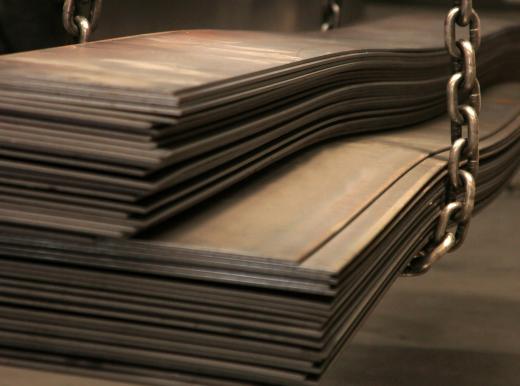Pack rolling is a sheet metal fabrication process used to produce several thin film sheets at the same time. The process has several advantages including not requiring the usual small roller sizes due to the increased starting thickness of the “pack” of raw stock. This allows the use of conventional rolling equipment and has no negative effect on the finished product. The process typically produces aluminum foil sheets for the lithographic printing, food packaging, and electronics industries. Pack rolled foils have a distinctive appearance featuring one side which is bright and the other having a matte finish.
Metal foils are produced by running sheet ingots through rollers of progressively smaller tolerances. Once a suitable thickness is achieved, the sheets are passed through foil rolling mills to produce the required finished thickness. Foils are classified as sheets of metal thinner than 0.0079 inches (200 µm). The most common of these foils is aluminum foil which is used extensively in a wide range of applications. Aluminum foil is often produced by an alternate process known as pack rolling.

This process has several advantages over more conventional foil rolling techniques which require specialized equipment. These foil rolling mills are specially configured to produce the thinner sheets and feature smaller, more expensive rollers. The single layer foils produced on these machines are difficult to work with and are prone to tearing. The process of rolling single sheets is also fairly slow. These issues are all addressed by using the pack rolling process.
Pack rolling involves feeding several sheets of stock through the roller at the same time. This effectively increases the starting thickness of the raw stock and does away with the need for small rollers. The extruded product is also tougher due to its increased thickness; it is also less inclined to tear, thus allowing for increased rolling speeds and better production rates. This process gives pack rolled aluminum foil its distinctive bright on one side and matte on the other appearance. This is caused by the surfaces in contact with the rollers being polished to a bright sheen while the those in contact with the foil remaining dull.
Pack rolling requires the raw sheets to be lubricated prior to rolling. For non-food industry foils, a kerosene-based lubricant is sprayed onto the sheets while food industry foil is sprayed with an industry approved lubricant. Foils become hard during rolling and are annealed or heated to resoften them after pack rolling. This heating burns all the excess lubricants off the foil and leaving a dry surface.
